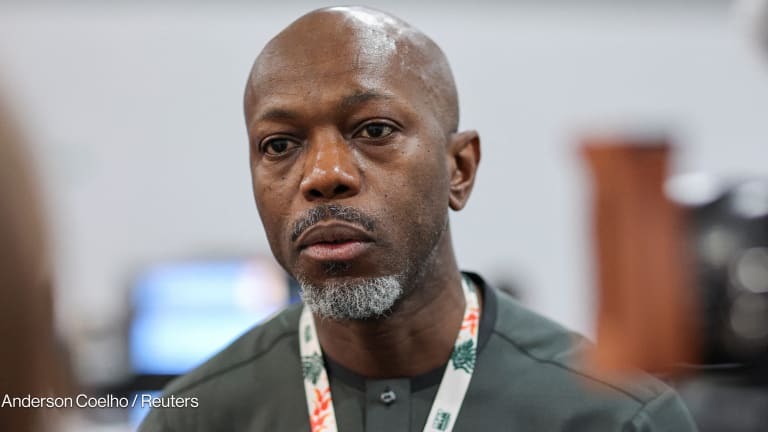Asset manager says EU's private sector push lacks 'realism'
Incofin's Loïc De Cannière says the EU is overly "suspicious" of private companies.
The European Commission’s attempt to spur high-impact investments around the world is too slow, too bureaucratic, and hamstrung by suspicion of the private sector, according to a Belgian asset manager. Loïc De Cannière, founder and managing partner at Incofin Investment Management, an impact investor with €1.2 billion in assets, told Devex that four years after the European Union executive began trying to use budget guarantees to steer investments into priority sectors in low-income countries, his firm is “extremely frustrated” by the commission’s “lack of realism and on-the-ground knowledge.” Headquartered in Belgium with offices in Colombia, India, Kenya, and Cambodia, Incofin’s investors include development funds, banks, insurance companies, and pension funds. Its portfolio features equity stakes and debt finance in areas such as microfinance and agriculture-related financial technology. On paper, it would seem an ideal partner for the commission as the latter tries to mobilize private money in aid of the Sustainable Development Goals. But speaking with Devex at the launch of Incofin’s India Progress Fund in Brussels last month, De Cannière expressed frustration at the European Fund for Sustainable Development, the European Commission’s de-risking platform. The scheme — launched in 2017 and substantially scaled up under the 2021-2027 budget — uses EU taxpayers’ money to take some of the potential loss, should investments by mostly European development banks fail. However, De Cannière said the existing model — whereby development finance institutions propose projects in response to investment windows set by the commission — is inefficient. The six windows for the 2021-2027 budget, recently shared with DFIs to facilitate a call for proposals early next year, were: agriculture, biodiversity, forests, and water; sustainable finance; human development; MSME finance; sustainable cities; and energy, transport and digital connectivity. “We have the impression that [the commission] more or less [defines] what should be done, and they define the type of funds that should be created,” De Cannière said, “instead of turning it around and saying, ‘Let people come with proposals and perhaps some of these proposals are interesting, and we can then select these proposals and fund them.’ But that's not possible today.” “It is so heavy, administrative, [and] bureaucratic,” he added. “As a private investor, you cannot just access those funds. We need to work with a DFI, which is endorsed by the European Commission, [and] then perhaps we can apply for some investment ... I don't think this is the right way to work.” The ability of budget guarantees to leverage private investment was a key pillar of the EU’s recent €300 billion ($340 billion) “Global Gateway” plan to counter China’s Belt and Road Initiative. However, the European Court of Auditors found last year that the commission’s leverage projections for the first iteration of EFSD under the 2014-2020 budget were “insufficiently reliable, and could be overestimated.” Mikaela Gavas, co-director of the Europe Programme and senior policy fellow at the Center for Global Development told Devex by email that the current approach leaves the commission too reliant on the largely European development banks that are allowed to access the scheme, such as France’s Agence Française de Développement or Germany’s KfW. “Put simply, the European Commission does not have the skills and adequate capacity to judge whether a particular proposed DFI investment is potentially transformative,” Gavas wrote. “Although the Commission retains ultimate management responsibility for the mechanism, it lacks the required banking expertise to operationalise it effectively.” “It is so heavy, administrative, [and] bureaucratic … We need to work with a DFI, which is endorsed by the European Commission, [and] then perhaps we can apply for some investment.” --— Loïc De Cannière, founder and managing partner, Incofin Investment Management At the same time, San Bilal, senior executive at the European Centre for Development Policy Management think tank, told Devex that DFIs “play a filtering role, selecting the most relevant private actors in terms of development impact [and] ensuring that they are not unduly subsidized and do not contribute to reinforcing dominant positions.” De Cannière said the commission suspects private sector companies “to have other agendas which are not development-oriented, and so that's why they are so suspicious and reluctant, and very slow.” “But I think there are many well-intentioned players in the private sector, who are absolutely willing to absorb some of these moneys and invest them in a very relevant way,” De Cannière said. “I think [the commission] just have to liberalize the procedures or make them more flexible.” De Cannière mentioned a water fund with Danone, saying: “It is so complicated to get money. And even worse, [the commission] then suspect Danone to have an improper agenda of looking for potential takeover candidates in Africa, which is complete nonsense. I mean, that's not the way Danone is looking at this.” The European Commission and Association of European Development Finance Institutions declined to comment.
The European Commission’s attempt to spur high-impact investments around the world is too slow, too bureaucratic, and hamstrung by suspicion of the private sector, according to a Belgian asset manager.
Loïc De Cannière, founder and managing partner at Incofin Investment Management, an impact investor with €1.2 billion in assets, told Devex that four years after the European Union executive began trying to use budget guarantees to steer investments into priority sectors in low-income countries, his firm is “extremely frustrated” by the commission’s “lack of realism and on-the-ground knowledge.”
Headquartered in Belgium with offices in Colombia, India, Kenya, and Cambodia, Incofin’s investors include development funds, banks, insurance companies, and pension funds. Its portfolio features equity stakes and debt finance in areas such as microfinance and agriculture-related financial technology. On paper, it would seem an ideal partner for the commission as the latter tries to mobilize private money in aid of the Sustainable Development Goals.
This story is forDevex Promembers
Unlock this story now with a 15-day free trial of Devex Pro.
With a Devex Pro subscription you'll get access to deeper analysis and exclusive insights from our reporters and analysts.
Start my free trialRequest a group subscription Printing articles to share with others is a breach of our terms and conditions and copyright policy. Please use the sharing options on the left side of the article. Devex Pro members may share up to 10 articles per month using the Pro share tool ( ).
Vince Chadwick is a contributing reporter at Devex. A law graduate from Melbourne, Australia, he was social affairs reporter for The Age newspaper, before covering breaking news, the arts, and public policy across Europe, including as a reporter and editor at POLITICO Europe. He was long-listed for International Journalist of the Year at the 2023 One World Media Awards.








